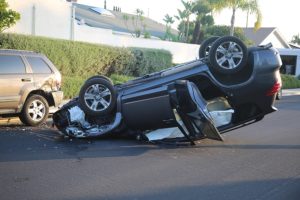What Is Considered a Rollover Car Accident?
March 25, 2022 | Car Accidents
Rollovers are terrifying car accidents that often cause severe injuries. A car can turn over for many reasons, with other drivers or parties to blame. If another driver leaves you or someone you love injured in a rollover accident, speak with an experienced car accident attorney today.
How Rollovers Happen?
Rollover car accidents occur when something causes two of a vehicle’s wheels to leave the ground, and the vehicle tips over onto its side, turns upside-down on the roof, or even completes several full rolls. These accidents can be single-vehicle or multi-car crashes and happen for many reasons.
Rollovers often occur when a vehicle trips over something on the road, collides with another vehicle, or a driver reacts suddenly to a risk. The greater the vehicle’s speed, the more dramatic the rolling can be.
Rollover accidents can occur on the highway or after a vehicle has run off the road, and often violently eject occupants from the vehicle. Ejections might happen when someone does not wear a seat belt, making fatalities far more likely.
The following statistics can help you better understand the danger of rollover accidents:
- In one recent year, 6,385 died in rollover accidents, and 74 percent of these accidents included an impact of some kind (often called tripping). No such impact preceded the other 26 percent.
- Of all passenger vehicle deaths, 28 percent occurred through rollovers.
- Of all fatal car accidents, truck accidents, and SUV accidents, 20 percent, 38 percent, and 39 percent happened from rollovers (respectively).
While nearly 5,000 occupants of passenger vehicles died because of rollovers involving only one vehicle in just one year, this doesn’t mean that another driver was not involved. Motorists frequently roll their vehicles while attempting to avoid a dangerous situation caused by another driver’s negligence (or worse). The risks associated with rollover accidents are extremely high.
Rollover Car Accidents Explained
While any vehicle can roll over in the right situation, top-heavy vehicles are far more likely to do so. These include vehicles that tend to be taller than wide, such as pickup trucks, SUVs, and vans. The higher the vehicle’s center of gravity, the greater the risk that it will roll when the circumstances are right.
When a heavily loaded SUV, for example, takes a tight curve, its center of gravity shifts, which can significantly affect the vehicle’s balance and its connection with the road. The faster the vehicle is traveling and the more significant the change in direction, the greater the chance it will roll over.
When motorists overcorrect for dangerous incidents on the road, the sudden directional shift is closely associated with rollovers.
You can lessen your risk of rolling over and protect yourself if your vehicle does roll if you:
- Wear a seatbelt every time you head out on the road and encourage others to do the same.
- Check your tires regularly, have regularly scheduled maintenance performed, and purchase new (high-quality) tires when you need them.
- Don’t exceed the speed limit and adjust your speed down when the condition of the road-or whatever is happening on the road-requires it.
- Don’t overload your vehicle. Carrying excessive additional weight on the top of your vehicle is especially dangerous. The safest location for placing extra weight in your vehicle is low and close to your car’s center.
- Remember that country roads are some of the most dangerous roadways out there.
The Other Driver’s Negligence
Many drivers roll their vehicles when they have no safe response to another driver’s extreme negligence. These emergency reactions can lead to rollovers. A prime example is when another vehicle traveling in the wrong direction barrels toward you in your lane. Your options decrease in such a situation, and your response can trip a rollover.
Extreme negligence of this sort comes in far too many life-threatening forms, including:
- Immense Speed – The higher a driver’s speed, the less control they have over their vehicle. Excess speed also increases the severity of the accidents it causes, and rollovers are a case in point. It’s also important to note that icy roads and high winds can significantly increase the risk of rollovers, and motorists are responsible for reducing their speed accordingly.
- Serious Impairment – Drunk drivers are hazardous drivers who can lose touch with reality and have very little impulse control. Drunk drivers are far more likely to speed down a road while traveling in the wrong direction, leading to deadly head-on accidents, rollovers, etc.
- Extreme Exhaustion – When a motorist falls asleep at the wheel, all bets are off in terms of safety. For example, if a vehicle heads into an oncoming lane, mayhem, including rollovers, can ensue.
- Aggression – There is no telling what a seriously aggressive driver will do behind the wheel, and sometimes their aggressively dangerous driving practices cause rollovers.
Calculating Your Losses
The injuries and attendant losses you experience resulting from a rollover accident that resulted from another driver’s negligence can be tremendous.
Medical Care
Your vehicle rolled over, which means you will almost certainly require emergency care. There is hospitalization, surgery, follow-up care, medical treatments and procedures, and more (in terms of medical costs). Depending upon how severe your injuries are-and rollovers tend to cause serious injuries-you may be facing ongoing medical needs and the ongoing expenses that come with them.
Lost Income
Serious injuries can keep accident victims off the job and cost them earnings. If your injuries affect your ability to continue earning at the same level or continue advancing your career, the financial setbacks will be even more burdensome and long-lasting.
Pain and Suffering
The physical pain and suffering you endure from a serious injury are clear. Yet, the psychological effects of surviving a violent and exceptionally frightening rollover accident can be challenging to comprehend fully. Many victims of rollover accidents experience terrifying flashbacks and severe emotional disturbances in response.
You Need an Experienced St. Louis Car Accident Attorney on Your Side

Chis Dixon, Personal Injury Lawyer
Rollover accidents are in a category of their own regarding the danger and terror they create. If someone else’s negligence causes your vehicle to roll and you suffer injuries, seeking just compensation for your entire range of physical, financial, and emotional losses is essential to your fullest recovery.
Insurance companies often blame injured drivers for rollovers, denying that their policyholder was involved. Proving another party’s liability for a single-car rollover requires investigation and evidence. You need the right legal team to prove your case and negotiate with insurers.
If you have concerns about how to afford legal fees, put those concerns to rest. Car accident lawyers handle cases on contingency, which means you pay nothing to hire an attorney, and you pay nothing unless the attorney wins your case.
You have nothing to lose and everything to gain by seeking a free case evaluation with a car accident lawyer. They can advise you whether you have a case and what next steps are necessary. Take action to protect your rights as an injury victim and contact a car accident attorney today.

